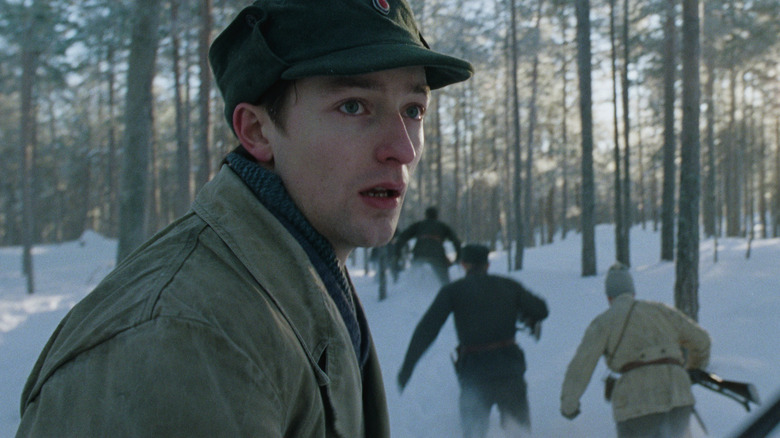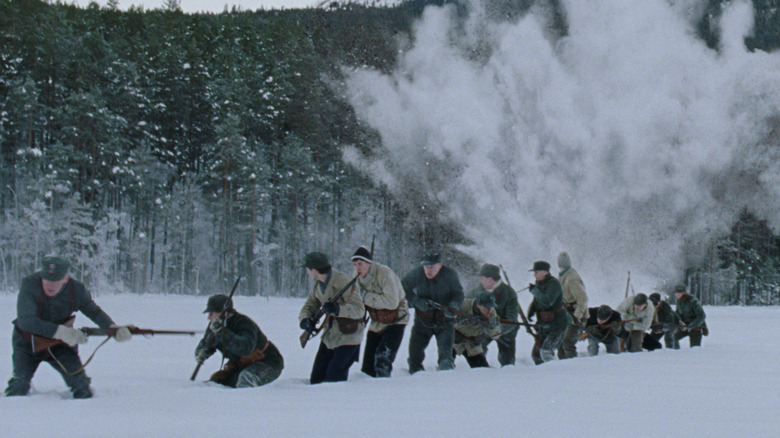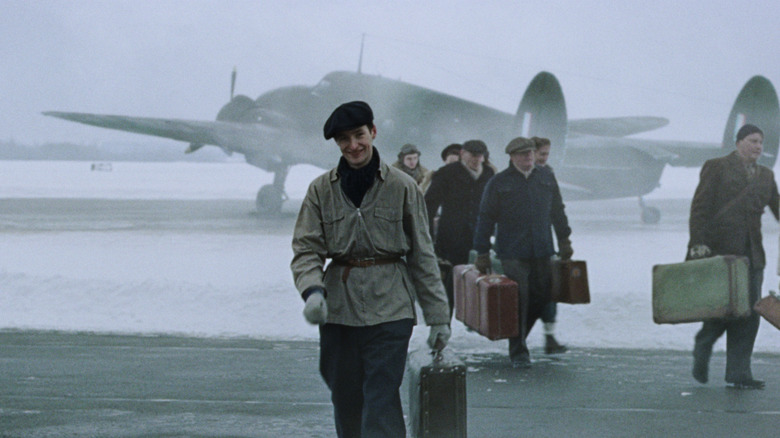
I’m not saying that watching a war movie about the rising tide of fascism and the choices we make to either give in or fight back feels oddly relevant these days … but, well, maybe that’s exactly what I’m saying. If there’s any genre that we can rely on to comment directly on our present-day political climate, after all, it’s this one. In recent years, WWII films have given us high water marks such as “Oppenheimer” and especially the disturbing horror of “The Zone of Interest.” But, like clockwork, we always seem to get an annual slew of titles ranging from “forgettable” to “downright misguided.” (Sorry, Mel Gibson, but I still haven’t forgiven you for “Hacksaw Ridge.”) It’s frustratingly common to make an undistinguishable feature that either tips into jingoistic territory or settles for shallow inspiration. It’s much more difficult — yet rewarding — to create something both timeless and urgent with one immaculately-crafted effort.
“Number 24” (also stylized as “Nr. 24”) accomplishes all this and more. It doesn’t come with the headline-making bona fides of a Christopher Nolan war epic (“Dunkirk” fans know he’s done two of them), the Oscar season punditry of an “All Quiet on the Western Front” remake, or even the rah-rah action of Guy Ritchie’s “The Ministry of Ungentlemanly Warfare.” What this Norwegian-language drama does instead is take a much more muted, restrained, and profoundly moving approach to a historical figure most of us Westerners have never even heard about. Although this is a dramatization of the feats of Gunnar Sønsteby, the real-life hero who resisted Nazi Germany’s occupation of Norway and went on to become the country’s most highly-decorated fighter, the film hardly ever steps into the same pitfalls of countless biopics before it. The results, quite frankly, are a breath of fresh air in a genre constantly at risk of feeling stale.
By steering well clear of typical conventions or clichés, director John Andreas Andersen and writer Erlend Loe take what could’ve been yet another unremarkable biopic and transform “Number 24” into one of the best, most underrated war dramas in years.
Number 24 is about finding courage in the margins
What kind of person does it take to face down an invading army of fascists and decide to risk everything to defeat them? “Number 24” poses this question almost right from the very start. We first meet Gunnar in the present day as an old man (played stoically by Erik Hivju) whose haunted narration neatly transitions to flashback scenes set amid Norway’s early fall to Nazi Germany in 1940. Here, he remarks early on that, “In a war, you have to figure out if you want to accept the situation you are in and to embrace what’s going to become your new reality, or stand up against it and thus risk everything.” Cutting pointedly to young Gunnar (played with remarkable steeliness and vulnerability by Sjur Vatne Brean), the script seems to indicate that he’s made his choice when he turns up to his accountant job like nothing’s happened — not too dissimilar to the way we clock into work, even while watching democracy burst at the seams on social media. Yet, a chance meeting with an underground resistance fighter sets him on a path that will define everything … not just his own life, but also the fate of his very country as well.
Viewers might be distracted by the framing device that places us in the perspective of an audience of students in present-day Norway, attending a lecture conducted by the elder Gunnar. But despite giving away the game that the freedom fighter does, in fact, survive the events of the film, not a single moment of tension feels sacrificed. That’s largely because of the very specific stakes set by “Number 24.” Every act of resistance and rebellion can decide between life or death, of course, but Gunnar puts it perfectly after he’s asked his age (25, he confirms) and is informed that, “There’s a chance you won’t grow older. Have you thought of that?” His sobering response? “I can accept that.” There’s simply more at risk than whether he lives or not.
His courage isn’t the only example on display throughout “Number 24,” however. Everywhere he turns, fellow compatriots make similar choices: local baker Reidun (Ines Høysæter Asserson) facilitates secret meetings of resistance fighters at the risk of her wellbeing, a captured soldier decides they would rather die than crack under relentless Nazi torture, and even Gunnar’s own parents support him despite knowing that, at any moment, their son’s hidden identity as the resistance leader could leak out and lead the SS right to their doorstep.
Number 24 is the most detail-oriented WWII movie you’ll ever see
Don’t be fooled by the promise of explosive acts of sabotage, CGI-filled destruction, and all the usual heist-movie vibes that accompany war movies based on true stories like this. Though “Number 24” certainly includes a handful of tense set pieces and cathartic moments of Norwegian “terrorists” doing everything in their power to force the Nazi invaders from their land, the real pleasure of watching this film comes from its attention to detail. Rarely has spycraft, resistance fighting, and antifascism been depicted with as much minimalism — or an utter disinterest in flashiness — as it is here. Director of photography Pål Ulvik Rokseth picks his spots for scenes with dramatic lighting and even a few carefully-chosen moments of interpretive flourishes (such as when we see Gunnar “witnessing” a certain event that he couldn’t actually have been in the room for or an unexpected, anachronistic Radiohead needle drop), but otherwise embraces a dreary and washed-out color palette to match the hopelessness in the air.
This emphasis on the mundane trickles down to the very plot of the film, where we’re constantly treated to the forgotten and oftentimes unsexy logistics of raising a secret network of fighters. That’s not to say a single moment of this narrative ever comes across as boring, mind you. Even while Gunnar serves as his embattled government’s “eyes and ears” in Oslo, tirelessly doing the legwork of building contacts and establishing trust and strategically avoiding Nazi patrols, we’re confronted with the extreme steps it takes for anyone to survive (let alone thrive) under such extreme circumstances. Gunnar allows himself no vices that might distract from the mission, be it women or drinking or even taking a moment to breathe easy, and we see the toll this takes — both during his war-torn past and his PTSD-riddled present.
By the time we roll toward the emotional conclusion, the film plays its final hand and reveals itself as a thoughtful meditation on the cost of fighting for freedom. The sacrifices we make will be significant and we’ll have no choice but to live with the consequences … but isn’t that better than rolling over in the face of authoritarianism? Gunnar Sønsteby represents the ultimate lesson in understanding the gravity of the situation, and his story will leave you grateful for uncovering this little-known chapter of history.
“Number 24” is currently streaming on Netflix.




Leave a Reply